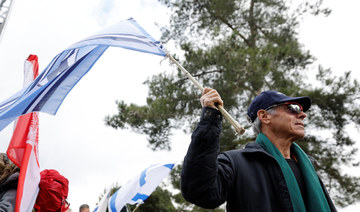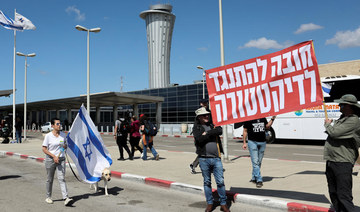TEL AVIV, Israel: Israeli Prime Minister Benjamin Netanyahu had to be airlifted Thursday to the country’s main international airport for an overseas trip after throngs of cars and protesters prevented him from driving there.
The demonstrations were part of nationwide protests underway for more than two months against Netanyahu and his government’s contentious plan to overhaul the judiciary. Demonstrators made blocking Netanyahu’s airport route Thursday a centerpiece of their efforts — the optics of the Israeli leader having to make alternate travel plans a win for the protest movement.
The helicopter ride, while avoiding snarling traffic triggered by the protest, could deepen Netanyahu’s reputation as being out of touch with Israelis at a time when the economy is slowing and the country finds itself torn apart over the government’s plan.
Israel’s figurehead president, Isaac Herzog, who has been trying to mediate a compromise between Netanyahu’s allies and the opposition, appealed for a solution in a televised speech late Thursday.
“What is happening here is a tragedy,” he said as protests continued late into the evening.
Herzog, whose role as president is supposed to be as a unifying force and largely above politics, said the draft promoted by Netanyahu should be dropped immediately. “It is wrong. It is destructive. It undermines our democratic foundations,” he said.
He insisted that weeks of behind-the-scenes talks had brought the sides closer to an agreement. “History will judge you. Take responsibility, now,” he said.
Speaking later in Rome, Netanyahu appeared to praise Herzog’s efforts, saying “We are all brothers.”
Thursday’s protests also disrupted a visit by US Defense Secretary Lloyd Austin, whose schedule was rearranged to keep his engagements close to the airport.
Austin briefly waded into Israel’s domestic turmoil, repeating at a news conference President Joe Biden’s recent comments that the “genius of American democracy and Israeli democracy is that they are both built on strong institutions, on checks and balances and on an independent judiciary.”
He also noted Biden had stressed the need for “building consensus for fundamental changes.”
The protesters “day of resistance to dictatorship” started with crowds descending on the country’s main international airport waving Israeli flags and blocking the road leading to the departures area with their cars.
Elsewhere, protesters blocked main intersections and scuffled with police in the seaside metropolis of Tel Aviv and other cities. A small flotilla of paddleboards and kayaks tried to close off a main maritime shipping lane off the northern city of Haifa. Some protesters barricaded the Jerusalem offices of a conservative think tank helping to spearhead the judicial changes.
“Israel is on the verge of becoming an autocratic country. The current government is trying to destroy our democracy, and actually destroy the country,” said Savion Or, a protester in Tel Aviv.
The uproar over Netanyahu’s legal overhaul has plunged Israel into one of its worst domestic crises. Beyond the protests, which have drawn tens of thousands of Israelis to the streets and recently became violent, opposition has surged from across society, with business leaders and legal officials speaking out against what they say will be the ruinous effects of the plan. The rift has affected Israel’s military, which is seeing unprecedented opposition from within its own ranks.
Later Thursday, the military said it suspended a pilot, identified in Israeli media as Col. Gilad Peled, until further notice, saying he had organized a pilots’ protest.
“Unionizing to synchronize absence from service, though coming from good intentions, is forbidden,” said Maj. Gen. Tomer Bar, Israel’s air force chief.
While some former top commanders have identified with the protesters, a group of 36 retired generals, including two former chiefs of staff, released a new letter saying the army must remain above politics.
“We demand that discussion or acts of insubordination be avoided,” said the generals.
Netanyahu, who took office in late December after a protracted political stalemate, and his allies say the measures aim to rein in a court that has overstepped its authority. Critics say the overhaul will upset the country’s delicate system of checks and balances and slide Israel toward authoritarianism.
Critics also say Netanyahu, who is on trial for corruption, is driven by personal grievances and that he could find an escape route from the charges through the overhaul. Netanyahu denies wrongdoing, and says the legal changes have nothing to do with his trial.
Despite the demonstrations, Netanyahu and his allies have pledged to press ahead with a series of bills that would strip the Supreme Court of its ability to review legislation and give coalition politicians control over judicial appointments.
The protesters’ main objective Thursday was to complicate Netanyahu’s journey to the airport ahead of a state visit to Rome. Police, handing out traffic tickets as protesters held signs reading, “dictator: don’t come back!” said they would clear the demonstrators by force if they did not move. There were no immediate reports of serious violence.
Netanyahu, who met Austin before his departure, arrived to the airport in a police helicopter, circumventing the protesters, Israeli media reported. Netanyahu’s office declined to comment.
Regular flights were not interrupted, an airport spokeswoman said, although some travelers said they had to leave their cars behind the protesters’ convoy and reach the terminal by foot.
Netanyahu told the Italian daily La Repubblica in an interview before his trip that the protests illustrated a vibrant democracy. But speaking to reporters before takeoff, he suggested the protesters were looking to oust him.
“The goal here is to topple a government that was elected democratically,” Netanyahu said. “We won’t let anyone disrupt Israeli democracy.”
The police, overseen by ultranationalist National Security Minister Itamar Ben-Gvir, pledged to prevent the disturbances and said they had made some 15 arrests.
Protesters descended onto Tel Aviv’s main highway, blocking midday traffic as mounted police and a water cannon truck hovered nearby. Police allowed the protesters to remain on the highway for over an hour but cleared it in some places by force ahead of afternoon rush hour.
Red billboards festooning the highway read, “resistance to dictatorship is mandatory.”
Critics say Ben-Gvir, a key ally in Netanyahu’s coalition government who has dubbed the protesters “anarchists”, is trying to politicize the police.
Later Thursday, Ben-Gvir removed Tel Aviv’s police chief over what he felt was a weak response to the protests, according to Israeli media. Police said Avichai Eshed was being reassigned.
Eshed declined to discuss the matter while speaking to reporters at the scene of a shooting attack late Thursday, when a Palestinian gunman opened fire on a crowded street in central Tel Aviv, wounding three people before he was shot and killed.
The shooting came hours after an Israeli military raid killed three Palestinian militants in the occupied West Bank, the latest violence in a year-long wave of Israel-Palestinian fighting that shows no signs of slowing.
Thursday’s demonstration in Tel Aviv, the country’s business center and its liberal heartland, was not nearly as large as one last week, when police cracked down on what had otherwise been peaceful protests, lobbing stun grenades and scuffling with demonstrators. Those protests ended with Netanyahu’s wife Sara being extracted from a ritzy Tel Aviv hair salon where demonstrators had gathered after catching wind of her presence.
Netanyahu and his wife have gained notoriety for enjoying lavish lifestyles and living off the largesse of taxpayers and wealthy supporters.
Some pundits questioned why Netanyahu was flying to Italy for three days at a time of deep national crisis, suggesting the couple were actually traveling to celebrate their wedding anniversary. Netanyahu’s schedule includes a meeting with Italy’s prime minister on Friday, but he does not return until Saturday night.
Thursday’s visit by Austin, who is on a Mideast tour, was also affected by the protests. His meetings were held at the airport and he did not travel to the Defense Ministry, located in the central Tel Aviv area where protests have been focused.
Netanyahu airlifted to airport after protesters block road
https://arab.news/bbd5k
Netanyahu airlifted to airport after protesters block road
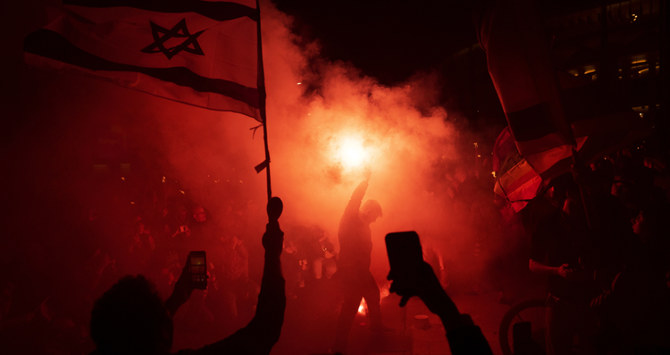
Fierce fighting in northern Gaza as aid starts to roll off US-built pier

- Residents said Israeli bulldozers were demolishing homes and shops in Jabalia in the path of the advance
- In the south, Palestinian militants put up a fierce resistance, attacking tanks massing around Rafah
- Hamas says US floating aid pier is no substitute for end of Israeli siege of Gaza
CAIRO: Israeli forces battled Hamas fighters in the narrow alleyways of Jabalia in northern Gaza on Friday in some of the fiercest engagements since they returned to the area a week ago, while in the south militants attacked tanks massing around Rafah.
Residents said Israeli armor had thrust as far as the market at the heart of Jabalia, the largest of Gaza’s eight historic refugee camps, and that bulldozers were demolishing homes and shops in the path of the advance.
“Tanks and planes are wiping out residential districts and markets, shops, restaurants, everything. It is all happening before the one-eyed world,” Ayman Rajab, a resident of western Jabalia, said via a chat app.
Israel had said its forces cleared Jabalia months earlier in the Gaza war, triggered by the deadly Hamas-led attacks on southern Israel on Oct. 7, but said last week it was returning to prevent Islamist militants re-grouping there.
In southern Gaza bordering Egypt, thick smoke rose over Rafah, where an escalating Israeli assault has sent hundreds of thousands of people fleeing from what was one of the few remaining places of refuge.
“People are terrified and they’re trying to get away,” Jens Laerke, UN humanitarian office spokesperson, said in Geneva, adding that most were following orders to move north toward the coast but that there were no safe routes or destinations.
As the fighting raged, the US military said trucks started moving aid ashore from a temporary pier, the first to reach the besieged enclave by sea in weeks.
The World Food Programme, which expects food, water, shelter and medical supplies to arrive through the floating dock, said the aid was transported to its warehouses in Deir Al Balah in central Gaza and told partners it was ready for distribution.
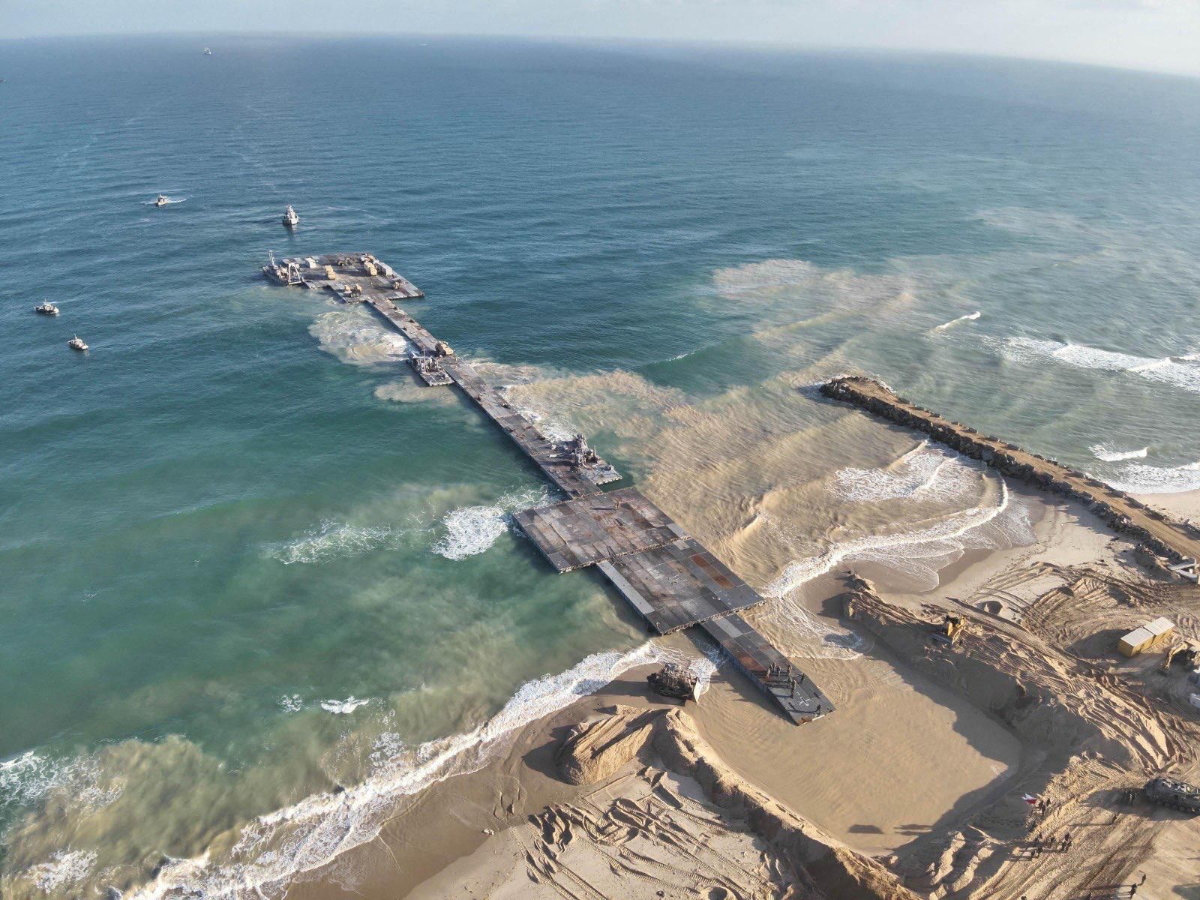
The United Nations earlier reiterated that truck convoys by land — disrupted this month by the assault on Rafah — were still the most efficient way of getting aid in.
“To stave off the horrors of famine, we must use the fastest and most obvious route to reach the people of Gaza – and for that, we need access by land now,” deputy UN spokesperson Farhan Haq said.
US aid was arriving in Cyprus for delivery to Gaza via the new pier, Washington said.
Hamas demanded an end to Israel’s siege and accused Washington of complicity with an Israeli policy of “starvation and blockade.”
The White House said US national security adviser Jake Sullivan would visit Israel on Sunday and stress the need for a targeted offensive against Hamas militants rather than a full-scale assault on Rafah.
A group of US medical workers left the Gaza Strip after getting stuck at the hospital where they were providing care, the White House said.
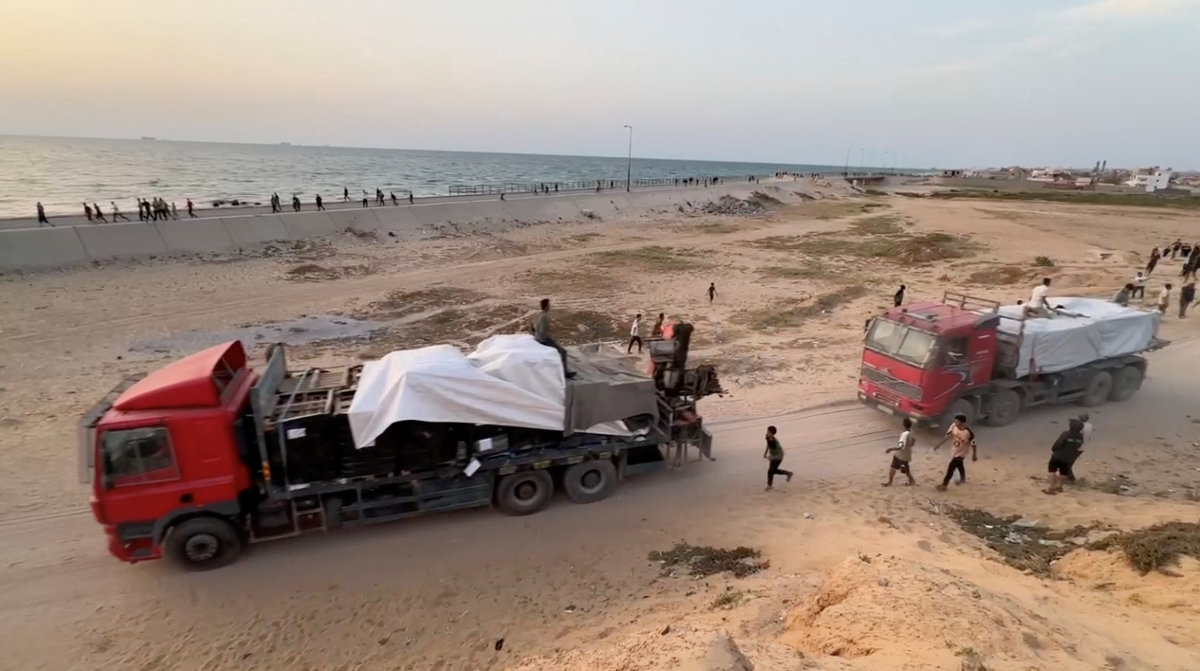
Humanitarian fears
The Israel Defense Forces said troops killed more than 60 militants in Jabalia in recent days and located a weapons warehouse in a “divisional-level offensive.”
A divisional operation would typically involve several brigades of thousands of troops each, making it one of the biggest of the war.
“The 7th Brigade’s fire control center directed dozens of airstrikes, eliminated terrorists and destroyed terrorist infrastructure,” the IDF said.
At least 35,303 Palestinians have now been killed, according to figures from the enclave’s health ministry, while aid agencies have warned repeatedly of widespread hunger and dire shortages of fuel and medical supplies.
Israel says it must capture Rafah to destroy Hamas and ensure the country’s safety. In the Hamas attack on Oct. 7, 1,200 people died in Israel and 253 were taken hostage, according to Israeli tallies. About 128 hostages are still being held in Gaza.
Israel said on Friday that its forces retrieved the bodies of three people killed at the Nova music festival in Israel on Oct. 7 and taken into Gaza.
In response, Hamas said negotiations were the only way for Israel to retrieve hostages alive: “The enemy will not get its prisoners except as lifeless corpses or through an honorable exchange deal for our people and our resistance.”
Talks on a ceasefire have been at an impasse.
’Tragic war’
Israeli tanks and warplanes bombarded parts of Rafah on Friday, while the armed wings of Hamas and Islamic Jihad said they fired anti-tank missiles and mortars at forces massing to the east, southeast and inside the Rafah border crossing with Egypt.
UNRWA, the main UN aid agency for Palestinians, said more than 630,000 people had fled Rafah since the offensive began on May 6.
“They’re moving to areas where there is no water — we’ve got to truck it in — and people aren’t getting enough food,” Sam Rose, director of planning at UNRWA, told Reuters on Friday by telephone from Rafah, where he said it was eerily quiet.
At the International Court of Justice, or World Court, in The Hague, where South Africa has accused Israel of violating the Genocide Convention, Israeli Justice Ministry official Gilad Noam defended the operation.
The South African legal team, which set out its case for fresh emergency measures the previous day, framed the Israeli military operation as part of a genocidal plan aimed at bringing about the destruction of the Palestinian people.
WHO says no medical supplies received in Gaza for 10 days

GENEVA: The World Health Organization said Friday that it has received no medical supplies in the Gaza Strip for 10 days as Israel pursues a new offensive against Hamas.
Israel’s closure of the Rafah crossing into Gaza has caused “a difficult situation,” WHO spokesman Tarik Jasarevic said. “The last medical supplies that we got in Gaza was before May 6.”
Israeli troops entered the city of Rafah on May 7 to extend their offensive against Hamas over the militant group’s attacks seven months earlier. They closed the Rafah crossing into Egypt that is crucial for humanitarian supplies.
With UN agencies warning of a growing risk of famine in Gaza, the Kerem Shalom and Erez crossings from Israel are also virtually shut down.
Jasarevic said the biggest concern was over fuel needed to keep clinics and hospitals running. Gaza’s health facilities need up to 1.8 million liters of fuel a month to keep operating.
The spokesman said only 159,000 liters had entered Rafah since the border closure. “This is clearly not sufficient,” he added, highlighting how only 13 out of 36 hospitals across the Palestinian territory were now “partially” operating.
“Hospitals still functioning are running out of fuel, and that puts so many lives at danger,” said Jasarevic. “Current military operations in Rafah are putting countless lives at risk.”
The Hamas attack on October 7 resulted in the death of more than 1,170 people in Israel, most of them civilians, according to an AFP tally based on official Israeli figures. Out of 252 people taken hostage, 128 are still held inside Gaza, but the army says 38 have died.
More than 35,300 people, mostly civilians, have been killed in the Palestinian territory since the war broke out, according to data provided by the health ministry of Hamas-run Gaza.
Hezbollah uses new weapons in Israel attacks

- The Israeli army said three soldiers were wounded in an attack on Thursday
- Hezbollah has a large arsenal of weapons, that it has expanded significantly in recent years
BEIRUT: Lebanon’s powerful armed group Hezbollah announced on Thursday it had used a drone capable of firing rockets at a military position in one of its latest attacks in northern Israel.
Israel and Hezbollah have been involved in near-daily exchanges of fire since the war between Israel and Hamas broke out on October 7.
Hezbollah announced it had used an “armed attack drone” equipped with two S-5 rockets on a military position in Metula in northern Israel.
The Iran-backed group published a video showing the drone heading toward the position, where tanks were stationed, with the footage showing the moment the two rockets were released followed by the drone exploding.
It was the first time they had announced the use of this type of weapon since the cross-border exchanges with Israel erupted in October.
The Israeli army said three soldiers were wounded in Thursday’s attack.
Hezbollah-affiliated media said that the drone’s warhead consisted of between 25 and 30 kilogrammes (55 and 66 pounds) of high explosive.
Military analyst Khalil Helou told AFP that the use of drones offers Hezbollah the ability to launch the attack from within Israeli territory, as they can fly at low altitudes, evading detection by radar.
Hezbollah also announced on Wednesday that it had launched a strike using “attack drones” on a base west of the northern Israeli town of Tiberias.
That attack was the group’s deepest into Israeli territory since fighting flared, analysts said.
In recent weeks, the Lebanese militant group has announced attacks that it has described as “complex,” using attack drones and missiles to hit military positions, as well as troops and vehicles.
It has also used guided and heavy missiles, such as Iran’s Burkan and Almas missiles, as well as the Jihad Mughniyeh missile, named after a Hezbollah leader killed by Israeli fire in Syria in 2015.
Helou, a retired general, said that depite its new weaponry, Hezbollah still relied primarily on Kornet anti-tank missiles with a range of just five to eight kilometers.
They also use the Konkurs anti-tank missile, which can penetrate Israel’s Iron Dome defense system.
Hezbollah has a large arsenal of weapons, that it has expanded significantly in recent years.
The group has said repeatedly that it has advanced weapons capable of striking deep inside Israeli territory.
Analysts have described the skirmishes between Israel and Hamas as a war of “attrition,” in which each side is testing the other, as well as their own tactics.
Hezbollah has expanded the range of its attacks in response to strikes targeting its munitions and infrastructure, or its military commanders.
One such Israeli strike on Wednesday targeted the village of Brital in Lebanon’s eastern Bekaa Valley, with the Israeli army later announcing it had hit a “terror target related to Hezbollah’s precision missile project.”
Helou said Hezbollah’s targeting of the base near Tiberias and its use of the rocket-equipped drone “can be interpreted as a response to the attack on Brital, but it remains a shy response compared to the group’s capabilities.”
He suggested that the Israeli strike likely hit a depot for Iranian missiles that had not yet been used by Hezbollah.
“Hezbollah does not wish to expand the circle of the conflict,” Helou said.
“What is happening is a war of attrition through which it is trying to distract the Israeli army” from Gaza and seeking to prevent it from “launching a wide-ranging attack on Lebanon.”
US officials held indirect talks with Iran on avoiding regional escalation: report

Two top Biden administration officials held indirect talks with Iranian counterparts this week in an effort to avoid escalating regional attacks, Axios reported on Friday.
The conversations marked the first round of discussions between the US and Iran since January, according to Axios.
One Palestinian killed, eight wounded in Israeli strike on West Bank refugee camp

- Israel has killed more than 35,000 Palestinians, according to Gaza’s Health Ministry
RAMALLAH, West Bank: At least one person was killed and eight wounded on Friday in an Israeli air strike on the Jenin refugee camp in the occupied West Bank, the Palestinian health ministry and Israeli military said.
The Palestinian health ministry said the eight wounded people were in stable condition and receiving treatment at hospitals. Reuters could not immediately confirm their identities.
The Israeli military said a fighter jet conducted the strike, a rarity in the West Bank, where violence had been surging long before the Gaza war.
Residents of the refugee camp said a house was targeted.
The West Bank is among territories Israel occupied in a 1967 Middle East war. Palestinians want it to be the core of an independent Palestinian state.



